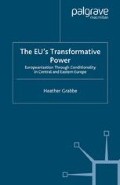Abstract
This book has examined EU influence in the CEE candidate countries, focusing on what the EU actively sought to change and the routes of Europeanisation that were established by the accession process. The EU had an enormous potential influence on public policy in CEE because between 1989 and 2004 every government in every applicant country claimed that EU membership was its first foreign policy priority. Moreover, beyond the attraction of membership, the EU had specific routes of influence through which it could shape political choices, in particular gate-keeping, benchmarking, models, money and advice.
Access this chapter
Tax calculation will be finalised at checkout
Purchases are for personal use only
Preview
Unable to display preview. Download preview PDF.
Copyright information
© 2006 Heather Grabbe
About this chapter
Cite this chapter
Grabbe, H. (2006). Conclusion. In: The EU’s Transformative Power. Palgrave Studies in European Union Politics. Palgrave Macmillan, London. https://doi.org/10.1057/9780230510302_9
Download citation
DOI: https://doi.org/10.1057/9780230510302_9
Publisher Name: Palgrave Macmillan, London
Print ISBN: 978-1-349-52540-9
Online ISBN: 978-0-230-51030-2
eBook Packages: Palgrave Political & Intern. Studies CollectionPolitical Science and International Studies (R0)

